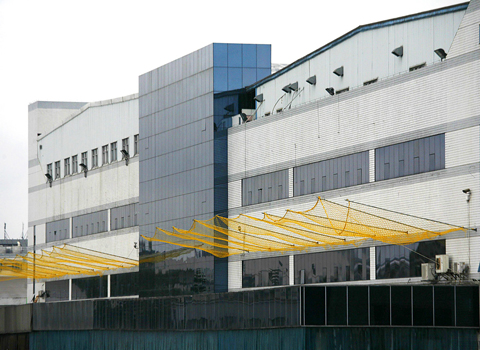Production line workers at iPhone maker Foxconn’s (富士康) southern China manufacturing hub will get a 30 percent pay raise, after a string of deaths at the site focused attention on working conditions in a region experiencing growing labor unrest.
Hon Hai Precision Industry (鴻海精密), owner of Foxconn, said yesterday that the cash component of wages would rise by 30 percent effective immediately, more than the 20 percent rise the company had talked about late last month.
It said the higher increase reflected rising prices in China, and it hoped to earn workers’ respect and raise efficiency.

PHOTO: REUTERS
Hon Hai’s shares fell as much as 2 percent in a broader market down 0.5 percent, while Foxconn shares shed 1.4 percent in Hong Kong.
A total of 10 workers have died at the company’s base in southern China this year, all apparently suicides. The deaths have triggered investigations by Apple and other big clients, including Dell Inc.
Apple CEO Steve Jobs, in his first public comment on the events, said on Tuesday that the deaths were “troubling,” but the factory “is not a sweatshop.”
“It’s a difficult situation,” Jobs said at the D8 annual gathering of top technology executives. “We’re trying to understand right now, before we go in and say we know the solution.”
Reasons for the apparent suicides are not totally clear, and analysts said wages may not be a major factor, if a factor at all.
However, demands for higher pay among workers in south China are likely to increase as a labor shortage in the region increases and gives workers more leverage.
“In Shenzhen, where the Foxconn factory is located, I think a basic wage of 2,000 yuan [US$293] a month is absolutely necessary. That’s double what it is at the moment,” Geoffrey Crothall of the China Labour Bulletin said in an interview.
However, many companies would be able to absorb the costs given their materials and shipping costs are dropping.
“Companies are largely going to absorb these costs and try to recoup them with higher export volume,” said Glenn Maguire, Asia chief economist at Societe Generale.
Analysts also noted that business models may change as the era of cheap south China labor comes to an end.
In a research note, JP Morgan said a 30 percent wage raise could cut Hon Hai’s net profit for this year by 10 percent, but there would be less impact next year. It believes the company will step up efforts to convince customers to move to less costly inland areas of China and may seek price rises.

MORE VISITORS: The Tourism Administration said that it is seeing positive prospects in its efforts to expand the tourism market in North America and Europe Taiwan has been ranked as the cheapest place in the world to travel to this year, based on a list recommended by NerdWallet. The San Francisco-based personal finance company said that Taiwan topped the list of 16 nations it chose for budget travelers because US tourists do not need visas and travelers can easily have a good meal for less than US$10. A bus ride in Taipei costs just under US$0.50, while subway rides start at US$0.60, the firm said, adding that public transportation in Taiwan is easy to navigate. The firm also called Taiwan a “food lover’s paradise,” citing inexpensive breakfast stalls

TRADE: A mandatory declaration of origin for manufactured goods bound for the US is to take effect on May 7 to block China from exploiting Taiwan’s trade channels All products manufactured in Taiwan and exported to the US must include a signed declaration of origin starting on May 7, the Bureau of Foreign Trade announced yesterday. US President Donald Trump on April 2 imposed a 32 percent tariff on imports from Taiwan, but one week later announced a 90-day pause on its implementation. However, a universal 10 percent tariff was immediately applied to most imports from around the world. On April 12, the Trump administration further exempted computers, smartphones and semiconductors from the new tariffs. In response, President William Lai’s (賴清德) administration has introduced a series of countermeasures to support affected

CROSS-STRAIT: The vast majority of Taiwanese support maintaining the ‘status quo,’ while concern is rising about Beijing’s influence operations More than eight out of 10 Taiwanese reject Beijing’s “one country, two systems” framework for cross-strait relations, according to a survey released by the Mainland Affairs Council (MAC) on Thursday. The MAC’s latest quarterly survey found that 84.4 percent of respondents opposed Beijing’s “one country, two systems” formula for handling cross-strait relations — a figure consistent with past polling. Over the past three years, opposition to the framework has remained high, ranging from a low of 83.6 percent in April 2023 to a peak of 89.6 percent in April last year. In the most recent poll, 82.5 percent also rejected China’s

PLUGGING HOLES: The amendments would bring the legislation in line with systems found in other countries such as Japan and the US, Legislator Chen Kuan-ting said Democratic Progressive Party (DPP) Legislator Chen Kuan-ting (陳冠廷) has proposed amending national security legislation amid a spate of espionage cases. Potential gaps in security vetting procedures for personnel with access to sensitive information prompted him to propose the amendments, which would introduce changes to Article 14 of the Classified National Security Information Protection Act (國家機密保護法), Chen said yesterday. The proposal, which aims to enhance interagency vetting procedures and reduce the risk of classified information leaks, would establish a comprehensive security clearance system in Taiwan, he said. The amendment would require character and loyalty checks for civil servants and intelligence personnel prior to